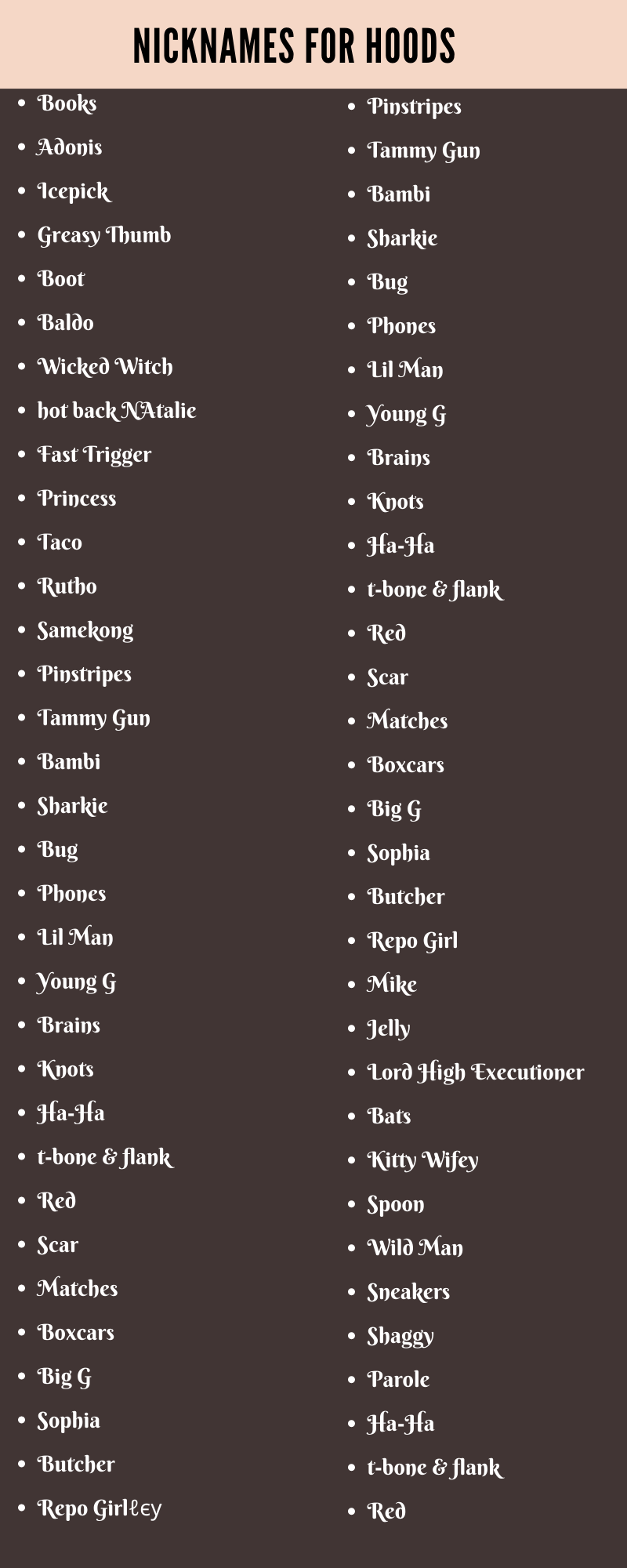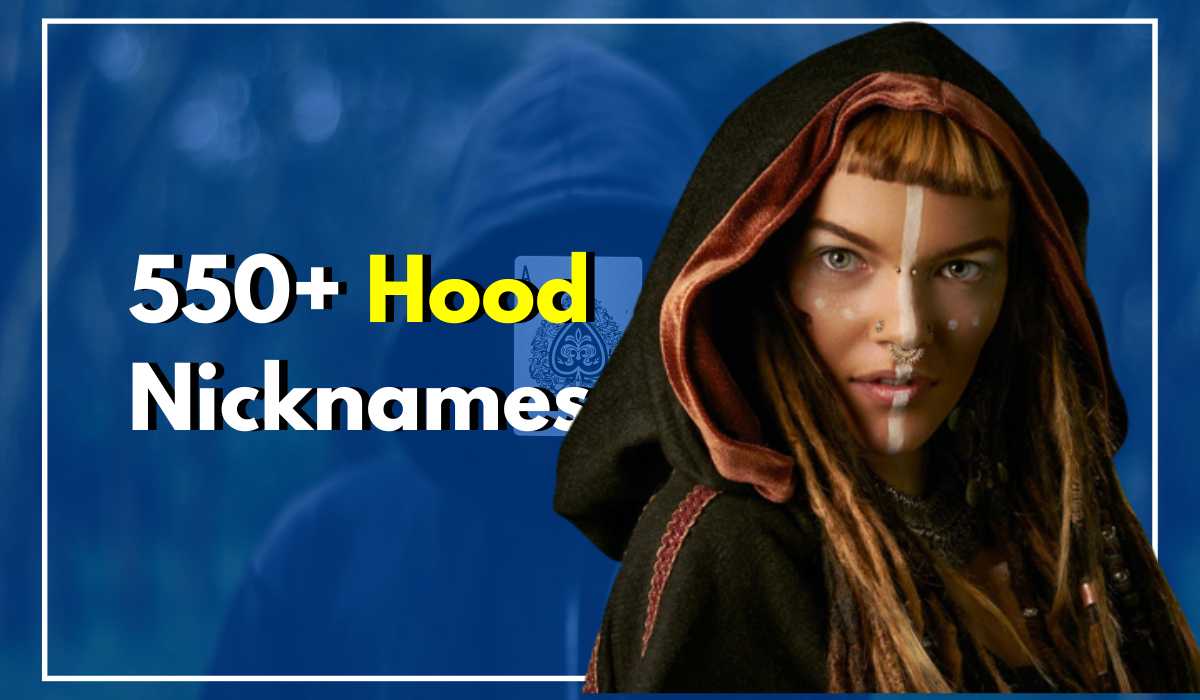Hood nicknames are monikers given to individuals within a particular neighborhood or community. They often reflect the person's personality, appearance, or experiences and serve as a form of endearment, identification, or respect within the local group
For example, someone named "Big Mike" might be known for their large stature, while "Speedy" could refer to someone known for their quick wit or fast running ability
Hood nicknames have existed for centuries and can be found in various cultures worldwide. In some communities, they are seen as a sign of respect and belonging and can help foster a sense of community and camaraderie among neighbors
Read also:Shadeur Sanders Mother A Behindthescenes Look At Her Influence
In other cases, hood nicknames can be used to identify or distinguish individuals within a particular group or gang. They can also be used to create a sense of anonymity or protection within a dangerous or hostile environment
Regardless of their purpose, hood nicknames play an essential role in many communities and can provide valuable insights into the culture, history, and social dynamics of a particular neighborhood or group
Here are some additional examples of hood nicknames:
- Shorty
- Slim
- Red
- Blue
- Doc
- Preacher
Hood Nicknames
Hood nicknames are monikers given to individuals within a particular neighborhood or community. They can serve various purposes, including endearment, identification, respect, or anonymity. Here are six key aspects of hood nicknames:
- Personal: Hood nicknames often reflect the person's personality, appearance, or experiences.
- Cultural: Hood nicknames can vary depending on the culture and community in which they are used.
- Historical: Hood nicknames have been used for centuries and can provide insights into the history of a particular neighborhood or group.
- Social: Hood nicknames can play a role in fostering a sense of community and belonging.
- Protective: Hood nicknames can sometimes be used to create a sense of anonymity or protection within a dangerous or hostile environment.
- Respectful: In some communities, hood nicknames are seen as a sign of respect and admiration.
These six aspects highlight the multifaceted nature of hood nicknames and their importance within the communities where they are used. They can serve as a form of personal expression, cultural identity, historical record, social bonding, protection, and respect.
1. Personal
The personal nature of hood nicknames is a key aspect of their significance and usage within communities. Hood nicknames often serve as a form of shorthand, allowing individuals to quickly and easily identify each other based on their unique characteristics. For example, someone with a particularly outgoing and friendly personality might be given the nickname "Smiley," while someone known for their athleticism or speed might be called "Flash."
Read also:Angus Turner Jones Hollywoods Former Star And His Transformative Journey
In some cases, hood nicknames can also reflect a person's appearance. For instance, someone with a large stature might be nicknamed "Big," while someone with a distinctive hairstyle might be called "Dreadlocks." These nicknames can serve as a way to celebrate and embrace individual differences within a community.
The personal nature of hood nicknames also contributes to their ability to foster a sense of belonging and camaraderie. When individuals share a common nickname, it can create a sense of shared identity and connection. This can be especially important in close-knit communities, where nicknames can help to strengthen social bonds and create a sense of unity.
Overall, the personal nature of hood nicknames is a key factor in their importance and usage within communities. Hood nicknames allow individuals to express their individuality, celebrate their differences, and foster a sense of belonging and connection.
2. Cultural
The cultural aspect of hood nicknames is significant because it reflects the unique values, beliefs, and practices of different communities. Cultural influences can shape the types of nicknames that are used, the meanings behind them, and the way they are bestowed upon individuals.
For example, in some cultures, it is common to give nicknames that are based on a person's physical attributes or personality traits. In other cultures, nicknames may be more closely tied to a person's family history or social status. Additionally, the use of nicknames can vary depending on the age, gender, and social group of the individuals involved.
Understanding the cultural context of hood nicknames is important for several reasons. First, it can help to avoid misunderstandings or offense when interacting with people from different cultural backgrounds. Second, it can provide insights into the history and traditions of a particular community. Third, it can help to foster a greater appreciation for the diversity of human cultures.
Here are some real-life examples of how cultural influences can shape hood nicknames:
- In some African-American communities, it is common to give nicknames that are based on a person's skin color or hair texture. For example, someone with dark skin might be called "Black" or "Dark," while someone with light skin might be called "White" or "Light."
- In some Hispanic communities, it is common to give nicknames that are based on a person's family name. For example, someone with the last name "Garcia" might be called "Gordo" (fat) or "Flaco" (skinny), regardless of their actual weight.
- In some Asian communities, it is common to give nicknames that are based on a person's personality traits. For example, someone who is always smiling might be called "Happy" or "Smiley," while someone who is always getting into trouble might be called "Trouble" or "Naughty."
These examples illustrate how cultural influences can shape the types of hood nicknames that are used in different communities. By understanding the cultural context of hood nicknames, we can better appreciate the diversity of human cultures and avoid misunderstandings or offense when interacting with people from different backgrounds.
3. Historical
Hood nicknames have a rich history, dating back centuries. They can provide valuable insights into the history of a particular neighborhood or group, reflecting the culture, values, and experiences of the people who live there. Here are a few ways in which hood nicknames can serve as historical markers:
- Occupational nicknames: Many hood nicknames are based on a person's occupation or trade. For example, the nickname "Smith" was originally given to blacksmiths, while the nickname "Cooper" was given to barrel makers. These nicknames can provide insights into the economic activities and industries that were prevalent in a particular area.
- Geographical nicknames: Some hood nicknames are based on a person's place of origin or residence. For example, the nickname "York" might be given to someone who comes from the city of York, while the nickname "Brooklyn" might be given to someone who lives in the Brooklyn neighborhood of New York City. These nicknames can provide insights into the migration patterns and settlement history of a particular area.
- Physical characteristics: Some hood nicknames are based on a person's physical characteristics. For example, the nickname "Red" might be given to someone with red hair, while the nickname "Shorty" might be given to someone who is short in stature. These nicknames can provide insights into the physical appearance and genetic makeup of the people who lived in a particular area.
- Personality traits: Some hood nicknames are based on a person's personality traits. For example, the nickname "Smiley" might be given to someone who is always smiling, while the nickname "Grumpy" might be given to someone who is always complaining. These nicknames can provide insights into the social interactions and interpersonal relationships within a particular area.
By studying hood nicknames, historians and sociologists can gain valuable insights into the social, economic, and cultural history of a particular neighborhood or group. Hood nicknames can provide clues about the origins of a community, the occupations of its residents, the physical environment, and the social dynamics of its people.
4. Social
Hood nicknames play a significant role in fostering a sense of community and belonging within neighborhoods and groups. They serve as a form of social glue, connecting individuals and creating a shared sense of identity. Here's how hood nicknames contribute to social bonding:
Recognition and identification: Hood nicknames provide a quick and easy way for people to recognize and identify each other, especially in large or close-knit communities. They eliminate the need for formal introductions or lengthy descriptions, allowing for instant familiarity and a sense of camaraderie.
Shared experiences: Hood nicknames often reflect shared experiences, values, or interests within a community. They can be a way for people to bond over common ground, creating a sense of belonging and shared identity. For example, nicknames like "Coach" or "Doc" might be given to individuals who play a respected role in the community, fostering a sense of connection and support.
Breaking down barriers: Hood nicknames can help break down social barriers and create a more inclusive environment. By using nicknames, people can bypass formal titles or social hierarchies, fostering a sense of equality and mutual respect. This can be particularly important in communities where there may be socioeconomic or cultural differences.
Preserving culture: Hood nicknames can also play a role in preserving and transmitting cultural traditions within a community. They often reflect the unique language, customs, and values of a particular group, providing a sense of continuity and connection to the past.
Overall, hood nicknames are an important social phenomenon that can foster a sense of community and belonging, promote recognition and identification, facilitate shared experiences, break down barriers, and preserve cultural traditions. Understanding this social aspect of hood nicknames is crucial for appreciating their significance within communities.
Protective
In certain communities, particularly those marked by violence or instability, hood nicknames serve a protective function. They provide a degree of anonymity, allowing individuals to operate within their neighborhoods without drawing undue attention to themselves. This is especially important in contexts where personal safety is a concern. By using nicknames, individuals can maintain a level of separation between their public and private lives, reducing the risk of retaliation or harm.
For example, in gang-ridden areas, individuals may adopt nicknames to conceal their real identities and avoid detection by rival gangs or law enforcement. Nicknames can also be used to create a sense of unity and solidarity within a group, fostering a sense of belonging and protection amidst dangerous surroundings.
Understanding this protective aspect of hood nicknames is crucial for comprehending their significance within marginalized communities. Nicknames serve as a means of self-preservation and empowerment, allowing individuals to navigate dangerous environments with a degree of anonymity and safety.
Furthermore, the protective function of hood nicknames highlights their adaptability and resilience. In the face of adversity, communities have devised creative strategies to protect their members and maintain a sense of normalcy. Hood nicknames are a testament to the human capacity for survival and the importance of social bonds in challenging circumstances.
5. Respectful
In certain communities, hood nicknames carry a deep significance beyond mere identification. They serve as a form of respect and admiration, bestowed upon individuals who embody positive qualities or have earned the esteem of their peers. This facet of hood nicknames sheds light on their social and cultural importance within these communities.
- Recognition of Accomplishments
Hood nicknames can be used to recognize and honor individuals who have made significant contributions to their community. These nicknames often reflect the person's skills, talents, or achievements. For instance, someone known for their exceptional basketball skills might be given the nickname "Hoopstar," while someone respected for their wisdom and guidance might be called "Pops" or "OG."
- Expression of Affection
Beyond recognizing accomplishments, hood nicknames can also convey affection and camaraderie. They serve as a way for community members to express their fondness and admiration for one another. Nicknames like "Sweetheart," "Sunshine," or "Smiley" are often given to individuals who bring joy, kindness, or positivity to those around them.
- Acknowledgement of Status
In some communities, hood nicknames are used to acknowledge an individual's status or position within the social hierarchy. These nicknames may indicate the person's seniority, experience, or leadership qualities. For example, someone who is highly respected and influential within the community might be given the nickname "Big Homie" or "OG," signifying their status as a respected elder or mentor.
- Cultural Significance
Hood nicknames are often intertwined with the cultural values and traditions of a particular community. They may reflect the community's sense of humor, storytelling abilities, or unique linguistic expressions. Understanding the cultural context of these nicknames provides valuable insights into the community's shared history, beliefs, and social norms.
By exploring the respectful nature of hood nicknames, we gain a deeper appreciation for their multifaceted role within communities. They are not merely labels but rather expressions of respect, admiration, affection, and cultural identity. Hood nicknames serve as a powerful tool for social recognition, fostering bonds, acknowledging status, and preserving cultural heritage.
Frequently Asked Questions about Hood Nicknames
Hood nicknames are monikers given to individuals within a particular neighborhood or community, often reflecting their personality, appearance, or experiences. They play a significant role in fostering a sense of community and belonging, as well as providing recognition and respect. Here are answers to some frequently asked questions about hood nicknames:
Question 1: What is the purpose of hood nicknames?
Hood nicknames serve various purposes, including identification, endearment, respect, protection, and cultural expression. They provide a quick way to recognize and address individuals within a community and can convey affection, admiration, or acknowledgment of status or accomplishments.
Question 2: How are hood nicknames created?
Hood nicknames often arise spontaneously, based on a person's unique characteristics, behaviors, or experiences. They can be influenced by physical attributes, personality traits, occupation, or shared experiences within a community.
Question 3: Are hood nicknames only used in certain cultures or communities?
While hood nicknames are particularly prevalent in urban and marginalized communities, they are not exclusive to any particular culture or region. Similar practices exist in various cultures worldwide, serving as a means of informal identification and social bonding.
Question 4: Can hood nicknames be harmful or offensive?
While hood nicknames are generally intended to be positive or neutral, they can sometimes be perceived as disrespectful or demeaning. It is important to be mindful of the context and cultural nuances associated with hood nicknames to avoid causing offense.
Question 5: What is the significance of hood nicknames in understanding a community?
Hood nicknames offer valuable insights into the social dynamics, values, and cultural identity of a community. By studying the types of nicknames used, their meanings, and the individuals they are bestowed upon, researchers and community leaders can gain a deeper understanding of the community's history, social structure, and cultural norms.
In summary, hood nicknames are a multifaceted phenomenon that reflects the unique character and social fabric of communities. They serve various purposes, from identification and endearment to respect and cultural expression. Understanding the significance and context of hood nicknames provides valuable insights into the social dynamics and cultural identity of different communities.
Transition to the next article section...
Conclusion
Hood nicknames are a fascinating and multifaceted phenomenon that offers a glimpse into the social fabric and cultural identity of communities. They serve as a form of informal identification, endearment, respect, and cultural expression, reflecting the unique characteristics and shared experiences of individuals within a particular neighborhood or group.
Through the exploration of hood nicknames, we have gained a deeper understanding of their historical, social, and cultural significance. They provide valuable insights into the values, beliefs, and social dynamics of communities, acting as a lens through which we can observe the human capacity for creativity, resilience, and social connection.
As we move forward, it is important to recognize and celebrate the richness and diversity of hood nicknames. They are not merely labels but rather a reflection of the vibrant and ever-evolving tapestry of human culture. By embracing and understanding the significance of hood nicknames, we can foster a greater appreciation for the unique identities and experiences of the communities that create and use them.


